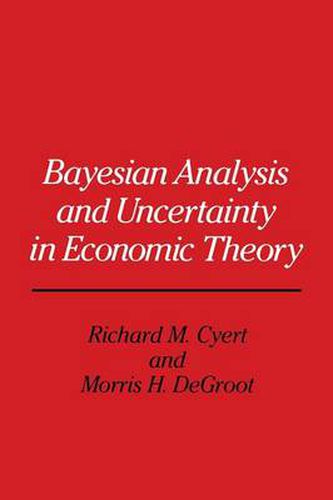Readings Newsletter
Become a Readings Member to make your shopping experience even easier.
Sign in or sign up for free!
You’re not far away from qualifying for FREE standard shipping within Australia
You’ve qualified for FREE standard shipping within Australia
The cart is loading…






This title is printed to order. This book may have been self-published. If so, we cannot guarantee the quality of the content. In the main most books will have gone through the editing process however some may not. We therefore suggest that you be aware of this before ordering this book. If in doubt check either the author or publisher’s details as we are unable to accept any returns unless they are faulty. Please contact us if you have any questions.
We began this research with the objective of applying Bayesian methods of analysis to various aspects of economic theory. We were attracted to the Bayesian approach because it seemed the best analytic framework available for dealing with decision making under uncertainty, and the research presented in this book has only served to strengthen our belief in the appropriateness and usefulness of this methodology. More specif ically, we believe that the concept of organizational learning is funda mental to decision making under uncertainty in economics and that the Bayesian framework is the most appropriate for developing that concept. The central and unifying theme of this book is decision making under uncertainty in microeconomic theory. Our fundamental aim is to explore the ways in which firms and households make decisions and to develop models that have a strong empirical connection. Thus, we have attempted to contribute to economic theory by formalizing models of the actual pro cess of decision making under uncertainty. Bayesian methodology pro vides the appropriate vehicle for this formalization.
$9.00 standard shipping within Australia
FREE standard shipping within Australia for orders over $100.00
Express & International shipping calculated at checkout
This title is printed to order. This book may have been self-published. If so, we cannot guarantee the quality of the content. In the main most books will have gone through the editing process however some may not. We therefore suggest that you be aware of this before ordering this book. If in doubt check either the author or publisher’s details as we are unable to accept any returns unless they are faulty. Please contact us if you have any questions.
We began this research with the objective of applying Bayesian methods of analysis to various aspects of economic theory. We were attracted to the Bayesian approach because it seemed the best analytic framework available for dealing with decision making under uncertainty, and the research presented in this book has only served to strengthen our belief in the appropriateness and usefulness of this methodology. More specif ically, we believe that the concept of organizational learning is funda mental to decision making under uncertainty in economics and that the Bayesian framework is the most appropriate for developing that concept. The central and unifying theme of this book is decision making under uncertainty in microeconomic theory. Our fundamental aim is to explore the ways in which firms and households make decisions and to develop models that have a strong empirical connection. Thus, we have attempted to contribute to economic theory by formalizing models of the actual pro cess of decision making under uncertainty. Bayesian methodology pro vides the appropriate vehicle for this formalization.